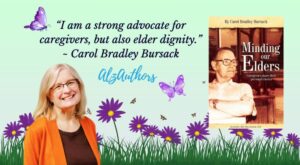Humor Shared Among Caregivers Is Therapeutic
I once visited a caregiver friend and her mother, who had moderate Alzheimer’s disease. At one point during the visit, the mother abruptly stood up, held out her hand and said to me, “You can go now.” I’d been warned that this might happen and I’d had years of experience with dementia patients, so I wasn’t the least bit offended. You see, Alzheimer’s disease has devastating effects on one’s memory, but it also affects judgment and social filters. My friend and I both managed not to laugh at my brusque dismissal; I simply thanked them for the lovely visit and said that it was indeed time for me to be off.
My friend and I have since shared many chuckles over this incident. Are we wrong to find amusement where we can get it? I don’t think so. We aren’t laughing at her mom who was—and remains—a lovely person. The truth is, dementia and aging aren’t laughing matters. But if we caregivers always examine our loved ones’ predicaments through a serious lens, the sadness of it all would be utterly consuming.
While some may consider it uncouth to find humor in elder care, laughter is often what helps many of us—caregivers and seniors alike—get through our most physically and emotionally difficult days. The gravity of our loved one’s situation is not lost on us, but we owe it to ourselves to find some sort of silver lining in the hard work that we do.
We Laugh so We Don’t Cry: Caregivers must handle difficult care decisions and an inordinate amount of stress every day. We’re constantly trying to cope with the knowledge that our loved ones are losing their independence, getting older and often living with serious medical conditions. Although we may be emotionally shredded by the changes in our loved ones’ physical and mental health, we soldier on trying to help them maintain their quality of life. This role leaves us caregivers feeling drained, isolated and often misunderstood.
However, nobody understands our burden and attempts at humor better than our fellow caregivers. A non-caregiver might misinterpret my friend and me, thinking we were laughing at her mom’s dementia-related behavior. But someone who has been in the trenches and interacted with a dementia patient before would instinctively recognize both the love and pain behind our laughter.
During the years that several of my loved ones lived in a nearby nursing home, I often found myself walking out the front door with other visiting family members and friends. We’d frequently ask one another how we were doing and how our loved ones were feeling.
Occasionally, our brief chats were sorrowful and perhaps accompanied by a few tears, but our interactions were frequently punctuated by laughs as well. The laughter was wry and tinged with pain but cathartic, nonetheless. It was aimed at an ugly disease or illness that was slowly destroying someone dear to us. The only alternative emotional outlet was crying, but most of us had shed buckets of tears already. Laughing together…
Minding Our Elders: Caregivers Share Their Personal Stories. “I hold onto your book as a life preserver and am reading it slowly on purpose…I don’t want it to end.” …Craig William Dayton, Film Composer
Discover the Difference. EGOSAN: The premium incontinence brand caregivers love – Now Available on Amazon.








